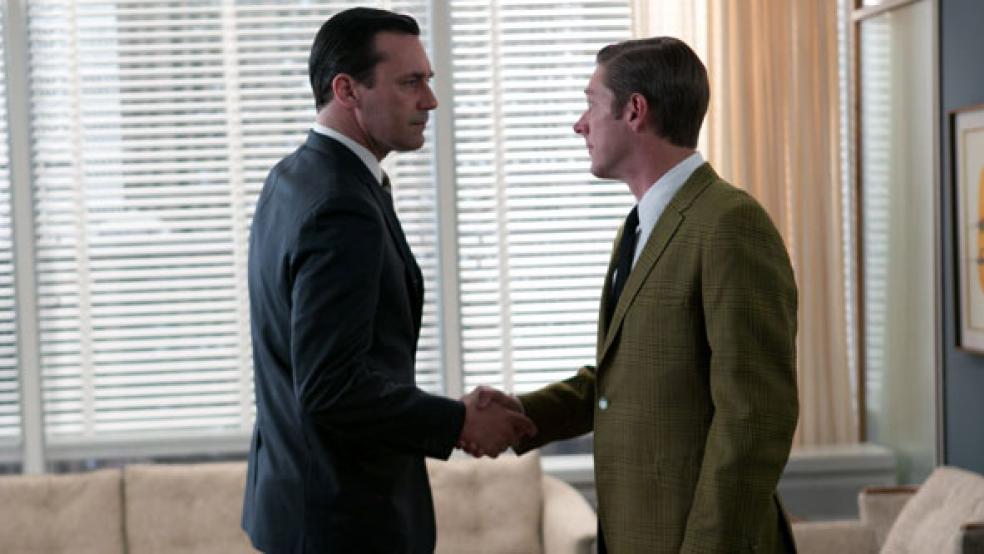The merger announced over the weekend between advertising behemoths Publicis and Omnicom – the second- and third-largest such organizations – threatens to produce a company that is too big to succeed.
Welcome to the real-life 21st century incarnation of “Mad Men,” a version that may trump the fictional show in terms of ego, power and ambition.
In theory, a deal of this magnitude holds all kinds of promise. The companies and leaders engaged in such huge transactions will inevitably pat themselves on the back. They’ll crow about the “economies of scale” and “cost-savings.” But those buzz words only account for one part of a deal’s outcome. Mostly, success or failure has to do with the people involved, both the employees of the organizations as well as the clients that they serve. And these are the areas where things can get tricky.
On paper, anyway, the new company indeed looks formidable. Publicis Omnicom Group, with a combined $22.7 billion in 2012 sales and more than 130,000 employees, vaults past the current industry pacesetter, WPP, which had $16.5 billion in sales last year.
Today, advertising experts are pondering the potential roadblocks that stand in the way, including regulatory pushback and the risks of missteps is a “merger of equals.” Then there’s the potentially long and lucrative list of client conflicts: Can the combined agencies keep both Coke, which Publicis handles, and Pepsi, an Omnicom account? The two agencies also control the advertising interests of the prominent German automakers.
Referring to the possible “client losses” and “difficult integration of IT or staff” Morgan Stanley analyst Julien Rossi suggested to clients that the “execution risk is real.” And analyst Brian Wieser of Pivotal Research Group stressed in a report that “scale does not necessarily lead to negotiating clout.” For instance, in 2001, Interpublic created Magna Global “at least in part in response to concerns related to the newly large scale of the parent companies of CBS, NBC, ABC and others.” Interpublic’s agencies at the time possessed the biggest portion of the market for media buying, accounting for approximately 25 percent of the industry.
Yet as Wieser points out, “‘clout’ did not come to fruition as it was originally intended as Magna did not have command and control over its affiliated agencies.”
As much as analysts are focused on potential stumbling blocks, the CEOs of the companies involved were sanguine about the risks involved in their deal. “If you look at the industry has changed quite dramatically in the last 15 years and all the holding companies as they are today already handling a lot of conflict,” Publicis CEO Maurice Lévy said on a conference call Monday, according to The Wall Street Journal. “If you look at any of our competitors, as small as it can be, you will see that they are handling conflicts because this is the story of our life.” Omnicom CEP John Wren said the combined companies expect to lose about 1 percent of revenues.
On paper, of course, the deal seems promising because the companies can celebrate projected cost savings that far outweigh any client billings that might be lost. Publicis and Omnicom are touting $500 million in projected “efficiencies.”
But the merger and acquisition annals are littered with disappointing amalgamations of juggernauts in the same industry. And today’s rapidly evolving digital world means the ad giants might have less to gain than they did in the days before advertisers could go directly to data-driven business like Google or Facebook for their online spending. "Clients today want us to be faster, more agile, more nimble and more entrepreneurial, not bigger and more bureaucratic and more complex," David Jones, the CEO of French ad agency Havas said in a statement released Sunday.
Still, Wall Street is bullish on the prospects for this transaction, showing confidence in the respective top managements of the companies, the potential to save money through consolidation and the promise of combining two world-class operations under the same global roof.
It’s a bold, high-stakes deal with game-changing implications. Don Draper would be proud.



